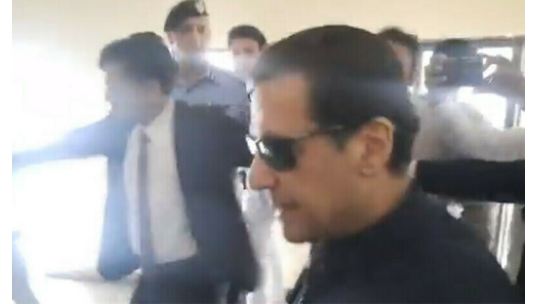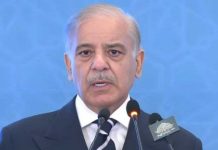ISLAMABAD, MAY 11: In a major relief for Pakistan Tehreek-e-Insaf (PTI), Chairman Imran Khan’s arrest in the Al-Qadir Trust case has been declared “illegal” by the Supreme Court and authorities have been ordered to release him “immediately”.
The court also directed Khan to approach the Islamabad High Court (IHC) once again.
The order came shortly after the PTI chief was presented in the apex court. He was brought in a convoy of 15 vehicles amid strict security.
The SC had directed the authorities to present Khan — who was ousted as the prime minister last year in April — at 4:30pm, but he was produced at around 5:40pm, more than an hour later.
When the hearing resumed, Chief Justice of Pakistan (CJP) Umar Ata Bandial told Khan, “it is good to see you.”
“We believe that Imran Khan’s arrest was illegal,” remarked the CJP.
CJP Bandial said that the IHC should hear the case tomorrow. “You will have to accept whatever the high court decides,” he added.
The CJP said that it is every politician’s responsibility to ensure law and order.
The directives to present Khan in the court came after the CJP termed the PTI leader’s arrest from the premises of Islamabad High Court (IHC) as a mighty disgrace to the country’s judicial establishment.
The CJP passed the remark while heading a three-member bench hearing PTI’s petition challenging Khan’s arrest. Apart from the CJP, the bench also includes Justice Athar Minallah and Justice Muhammad Ali Mazhar.
At the outset of the hearing, the former premier’s lawyer Hamid Khan informed the court that Khan had come to IHC in order to secure an extension in his interim bail. When the PTI chief was getting his verification done, Rangers personnel broke into the room.
“Rangers misbehaved with Imran Khan and arrested him,” he added.
At this, CJP Bandial inquired about the case in which Khan was seeking the bail extension.
Justice Minallah inquired if a plea can be filed before the biometric verification is conducted.
At this, the lawyer said that Khan went for biometric verification because a plea cannot be filed before that.
“Why did NAB take the law in its hand? It would have been better for NAB to seek permission from the IHC registrar,” Justice Minallah asked.
He said that every citizen has the right to get justice and the apex court had to ensure its provision. The judge also regretted the current situation in the country.
“Where did the sanctity of the court go with the arrest from the court premises?” CJP Bandial remarked.
Meanwhile, the CJP asked the number of personnel who arrested Khan.
At this, another member of Khan’s legal team Salman Safdar informed the court that 80-100 men were there to arrest the PTI chief.
“What was left of the honour of the court when 90 people entered the court premises? NAB has disrespected the court,” CJP Bandial said, adding that no one would feel safe inside a court anymore.
“No one can be arrested from the high court, Supreme Court or accountability court. Khan’s arrest violated judicial sanctity,” he added.
Meanwhile, Justice Minallah remarked that no one would come to the court if such arrests are made a norm.
“A person who has surrendered before a court cannot be arrested,” he added.
CJP Bandial then remarked that the court will review the legality of the NAB warrant and compliance on it.
“The right to surrender before the court cannot be sabotaged,” CJP added.
Meanwhile, Safdar informed the court that Khan is on the “target list of terrorists” and his security was withdrawn. He also informed that NAB’s investigation officer wasn’t present at the time of arrest.
“There is no example of the way in which rangers arrested Imran Khan,” said Safdar.
At this, Justice Minallah remarked that the anti-graft watchdog had been doing the same with different people for years.
Khan’s lawyer Safdar then told the bench that they got to know after the arrest that the warrants were issued on May 1. He added that interior secretary informed the court the PTI chief had not received the warrant.
When asked what did the petitioner seek, lawyer Hamid Khan requested the apex court to order Khan’s release.
“Illegal work cannot be ignored,” CJP Bandial remarked, adding access to justice is the right of every citizen.
Meanwhile, lawyer Hamid Khan maintained that Imran Khan was not accompanied by any activist or a party supporter on May 9.
At this point, Justice Mazhar inquired if Imran Khan had responded to NAB notices.
Replying to the query, the PTI chief’s lawyer said that a response had been sent to NAB.
He contended that a person cannot be arrested during an inquiry and NAB was bound to notify the accused upon completion of inquiry.
When asked if Imran Khan joined the investigations, his other lawyer Shoaib Shaheen said that they were about to send a response.
“NAB’s arrest warrant is illegal,” he contended.
At this, Justice Mazhar remarked that the case was on the compliance on NAB’s arrest warrant, not of the legality of the warrant. He also asked why the PTI chief had not challenged warrant and become part of the investigations.
Meanwhile, Justice Minallah remarked that NAB only wanted to make others follow the law but “it was evident that Imran Khan had also not complied to the NAB’s notice”.
Meanwhile, Justice Mazhar remarked that Imran Khan sent a respond to NAB in May for the notice he received in march.
At this, the lawyer said that Imran Khan received only one notice.
“Justice Mazhar is talking about the implementation of law,” Justice Minallah remarked. He further asked if NAB had sought the registrar high court’s permission for the arrest.
NAB Prosecutor General Asghar Haider responded that the watchdog sought the interior ministry’s help for the implementation of the arrest warrant.
“Did the interior ministry implement the arrest warrant in the court premises?” asked Justice Minallah.
At this, the NAB official maintained that the implementation on the NAB warrant was done while taking the ministry on board.
“NAB has not learned its lesson in many years. There are many allegations against NAB including political engineering,” Justice Minallah remarked, adding that the watchdog has destroyed the country.
At this, NAB lawyer Sardar Muzaffar said that the court should also see Imran Khan’s conduct as he had showed resistance in the past.
CJP Bandial remarked that as per NAB the federal government had decided the procedure of compliance.
“Was any NAB officer present at the time of arrest?” he asked.
However, the NAB officials failed to respond to this question.
Haider maintained that he wasn’t aware of all the facts as he had just been appointed. He said that even a private person can also execute warrant.
At this, Justice Minallah remarked that NAB itself continues to execute its warrant.
Meanwhile, CJP Bandial remarked that the warrant was issued on May 1 while the arrest was made on May 9.
“Why did NAB not try to make the arrest for eight days? Did NAB want to arrest Imran Khan from the court?” the top judge asked. He also asked why the letter was written to the interior ministry on May 8.
Meanwhile, Justice Minallah inquired how many notices Khan received.
At this, NAB prosecutor said that only one notice had been sent to Khan.
“It seems NAB’s warrant was not in accordance with the law,” Justice Minallah observed. He asked if an attempt had been made for the arrest after the warrant was issued.
“Imran Khan was in Lahore, why didn’t NAB ask the Punjab government for the execution of warrant?” he asked.
“Who arrested Imran Khan?” inquired CJP Bandial.
The NAB prosecutor replied that the law enforcers complied with the warrant on court order and according to IG Islamabad.
“Was the police monitoring the proceedings as per the court order?” questioned the CJP.
At this, Advocate General Islamabad Barrister Jahangir Khan Jadoon said that the Rangers arrested Khan while assisting the police.
The CJP asked how many Rangers personnel were present. To which, the advocate general said that the Rangers were there for the PTI chief’s security.
“NAB has expressed indifference with the compliance of the warrant,” remarked the CJP.
The advocate general said that there was no restriction under any law to seek permission from the registrar.
The CJP also inquired if the windows and the doors were broken.
Justice Minallah said that the windows cannot be broken even with the permission of the biometric branch. He also said to read Sections 47 to 50 of the Criminal Code in this regard.
At this, AG Jadoon said that it was not possible to arrest Khan somewhere else. “Imran Khan used to call on thousands of people on every appearance,” he added.
The CJP said that it is clear that no permission was taken.
CJP Bandial told the IG Islamabad to present Khan before the Supreme Court. He ordered to ensure that none of his supporters follow him to the court.
“Only Khan should be presented before the court. No party worker or crowd will be allowed to come to the court,” he remarked.
He added that the court was very serious about the vandalism and the loss of government property.
He said that the order will be issued today, adding that the investigation should be initiated from where the PTI chief was arrested.
Justice Minallah said that the way Khan was arrested cannot be defended.
The chief justice said that it was not expected of the incumbent government.
At this, the attorney general said that NAB was an independent institution.
“NAB has put all the blame on the federal government,” said Justice Minallah.
“NAB had requested to deploy the Rangers. They, however, did not request to deploy Rangers to execute warrants,” replied the attorney general.
Justice Minallah said: “Leave Imran Khan, even if there was a common citizen, this move would have been unbearable.”
He said that the court does not want to talk about the legality of the arrest warrant. “Other political parties were also treated badly. It is time to establish the rule of law in the country,” he added.
SC admits plea for hearing
The PTI had filed a petition in the Supreme Court a day earlier challenging the Islamabad High Court’s (IHC) decision calling party chief Imran Khan’s arrest by the National Accountability Bureau (NAB) “legal”.
Initially, the petition was returned to the PTI after registrar’s office attached objections to the plea.
The registrar’s office stated that the PTI chief did not approach the relevant forum, adding that he could file an intra-court appeal.
It further stated that the petition did not have the signatures of the PTI chief.
But, later on Wednesday, the PTI addressed the objections of the registrar’s office and it was accepted for a hearing.
Following Khan’s arrest on Tuesday inside the IHC, the PTI Vice Chairman Shah Mahmood Qureshi summoned an emergency meeting of the seven-member committee to review the situation and devise a comprehensive strategy to secure the safe and early release of the party chair.
The senior PTI leader had announced the party’s plan to move the apex court.
IHC terms Imran Khan’s arrest ‘legal’ in Al-Qadir Trust case
On Tuesday, the IHC termed the arrest of the PTI chairman “legal” in the Al-Qadir Trust case.
IHC Chief Justice Aamer Farooq — who had raised questions over the Rangers’ move to arrest Khan from the court’s premises earlier in the day — announced the reserved verdict.
The IHC also issued notices to the Islamabad inspector general of police and the interior secretary over contempt of court.
The chief justice ordered the high court registrar to get a first information report (FIR) registered over the circumstances of the arrest, which included manhandling the lawyers present nearby as well as damage to the court building.
He also instructed the registrar to conduct an inquiry and submit a report by May 16.
Khan — who has been embroiled in dozens of cases pending since he was ousted last year — was arrested inside the premises of the high court when he appeared before the court in two cases.
His came hours after the military rebuked the former international cricketer for alleging a senior officer had been involved in a plot to kill him.

















